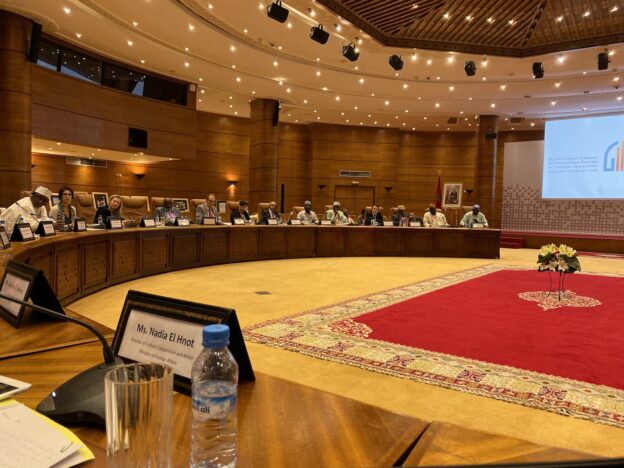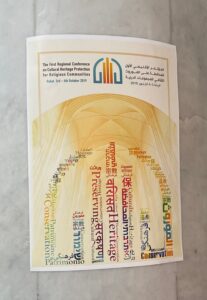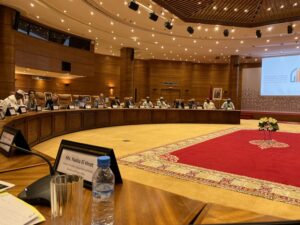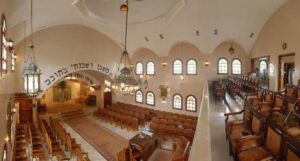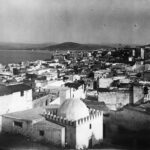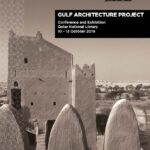The Moroccan Ministry of Foreign Affairs and International Cooperation, with the support of the U.S. Department of State and the partnership of the Rabita Mohammadia des Oulémas (Mohammadia Association of Ulema)recently organized the “First Regional Conference on Cultural Heritage Protection for Religious Communities” October 3-4 in Rabat, Morocco. AKDC Program Head Michael Toler was one of approximately 100 experts and government officials from Morocco, the US, Europe, and multiple countries in North Africa and the Sahel regions; as well as representatives of other International Organizations, NGOs and other organizations involved in the preservation of cultural heritage, who were invited to Rabat for the conference.
Toler spoke about the importance of AKDC@MIT collections in documenting religious cultural heritage that is at risk or has already been destroyed, and the importance of Archnet.org as a dissemination of knowledge about those resources. Archnet also serves as a dissemination vehicle of information about the Aga Khan Historic Cities Programme (AKDHCP) and the Aga Khan Award for Architecture (AKAA). AKHCP has long been directly involved in conservation of culturally significant religious sites, and the AKAA is often given for the restoration, conservation, or adaptive reuse of Religious heritage buildings. Toler offered to “provide whatever support we can to preservation and documentation efforts” that may be undertaken by the conference participants.
Over the course of two days panels were held on Safeguarding diversity of cultural and religious heritage: The Moroccan Experience; the role of International Community, International and Regional Organizations in supporting State efforts to preserve the diversity of cultural and religious heritage; the Importance of Promoting Respect, Protection and Preservation of Cultural and Religious Heritage, Equipping Religious Actors, Community Leaders, and other Civil Society Members to raise Public Awareness for Cultural Heritage Preservation; and finally International Efforts to Safeguard Cultural Heritage at Risk Through Funding, Technical Assistance and Training, on which Toler was a panelist.
Though the conference focused on questions of inter-religious tolerance between Christians, Jews, and Muslims attention was given to the fact that into-religious strife between sects of other groups can also be a major threat the preservation of religious heritage, as well as the fact that heritage destruction is on always deliberate. Neglect, urban development, and market forces can also constitute a serious threat.
According to the organizers,
the Conference is a follow-on to the Potomac Declaration and Plan of Action, agreed upon during the 2018 Ministerial to Advance Religious Freedom, which brought together over 80 countries and 400 members of civil society and religious communities to discuss how to promote religious freedom and protect religious communities. Participating countries were encouraged to host regional follow-up conferences over the following year to allow for more context-specific discussions, and to facilitate greater civil society participation.
The Concept Note distributed before the event points out why Morocco is an appropriate venue for such an event.
The First Regional Conference on Cultural Heritage Protection of Religious Communities demonstrates Morocco’s leadership on the preservation of cultural heritage. The actions taken by His Majesty King Mohammed VI to preserve and restore the Jewish and Christian cultural heritage have become a reference in the field. Jews, Christians and Muslims have coexisted peacefully in for centuries in Morocco, which has played a leading role in interfaith dialogue and has always been an outstanding model of cultural coexistence and interaction between Islam and other religions.
The Kingdom of Morocco is indeed the country of North Africa, which is home to the largest Jewish community, and the largest number of Jewish synagogues and cemeteries, as well as many churches open to Christians to freely worship. Furthermore, all believers in this land have widely enjoyed their rights and the protection of their lives and enjoyed equal treatment when it comes to the preservation of practices, lives and property.
Morocco which has long been committed to the time-honored traditions of tolerance and openness, a reality put forward by His Majesty King Mohammed VI in his speech, addressed to the participants in the Conference on “The rights of religious minorities in Islamic lands,” held in Marrakech in 2016, the King stressed that: “We, in the Kingdom of Morocco, see no reason for denying religious minorities any of their rights. We do not tolerate a violation of this kind being perpetrated in the name of Islam, nor do we tolerate any Muslim being involved in such an infringement. This firm belief is rooted in the proper understanding of religious principles, in our cultural heritage and in the history of this time-honored Kingdom; this explains the way Moroccan Muslims interact with each other and with followers of other religions.”
